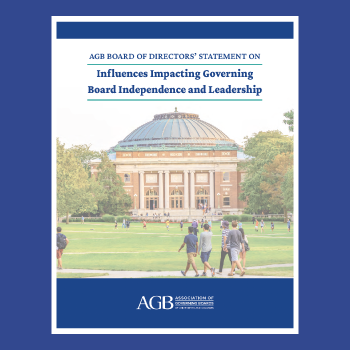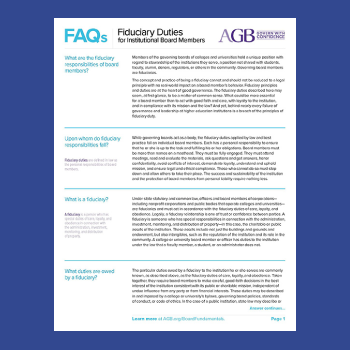Why this is important.
Fiduciary duties are at the heart of effective governance. Contrary to popular belief, fulfilling one’s fiduciary duties cannot be reduced to simply overseeing financial assets of colleges and universities. Governing boards must make good faith decisions in the best interest of their institutions by acting in accordance with the fiduciary duties of care, loyalty, and obedience. While boards act as a body, “the fiduciary duties applied by law and best practice fall on individual board members.”1 AGB empowers its members to ensure their governing boards’ actions align with their institutional mission and comply with the law.
Source:
1AGB Board of Directors’ Statement on the Fiduciary Duties of Governing Board Members, AGB 2015
Questions for boards.
Click below to reveal key questions for your board to consider:
Accountability
Consequential Questions:
- Does our board understand the elements of the duty of care, the duty of loyalty, and the duty of obedience? How is our board educated on these principles?
- Does our board understand how their fiduciary duties relate to their responsibilities in overseeing our institution? How does our board discuss these matters?
- Do our board members understand the ways in which they could be exposed to personal liability for breaching their fiduciary duties? What areas of liability exposure are of greatest concern to our board members?
Source:
AGB Board of Directors’ Statement on the Fiduciary Duties of Governing Board Members, AGB 2015
Culture
Consequential Questions:
- Does our board invite discussion and questions regarding matters before it?
- How does our board encourage full engagement by board members and enforce attendance requirements?
- How does our board assess its own performance in fulfilling its fiduciary duties?
- Has our board ever been impeded in fulfilling its fiduciary responsibilities by external influences? How should the board respond under these circumstances?
Source:
AGB Board of Directors’ Statement on the Fiduciary Duties of Governing Board Members, AGB 2015
Processes and Compliance
Consequential Questions:
- Does our board have a robust conflict of interest policy that also addresses dualities of interest? What does the board do when a conflict is identified?
- What internal controls are applied to prevent legal violations such as fraud, theft of intellectual property, embezzlement, athletics infractions, use of gifts in violation of donor intent, and employment discrimination? Are they effective?
- How does our board oversee legal compliance in the institution?
Source:
AGB Board of Directors’ Statement on the Fiduciary Duties of Governing Board Members, AGB 2015
Recommended resources.
We carefully curated these staff-picked resources for you:
Forum: When Will They Ever Learn?
Trusteeship magazine, January/February 2020
Roger Hull
















